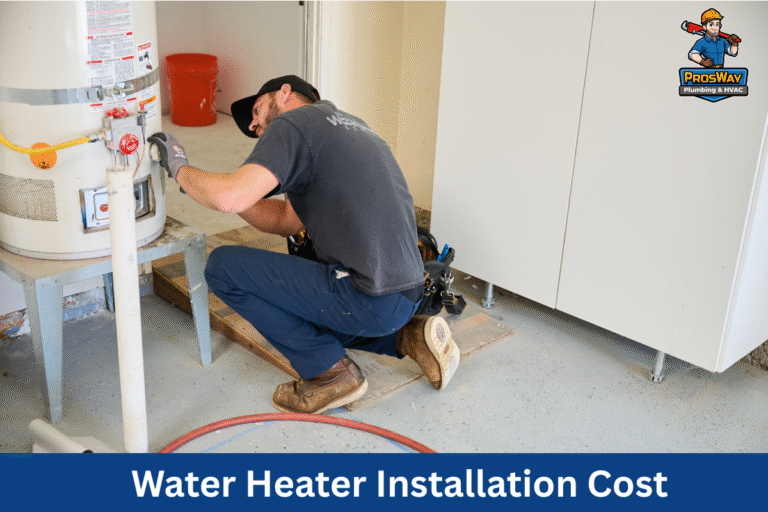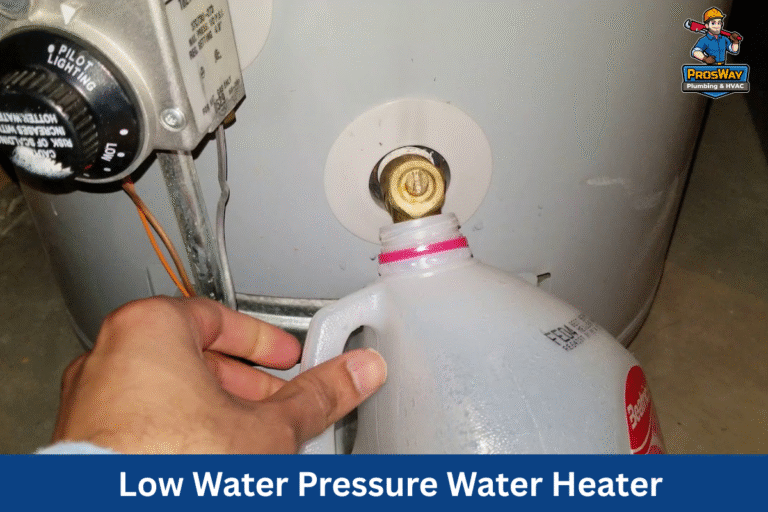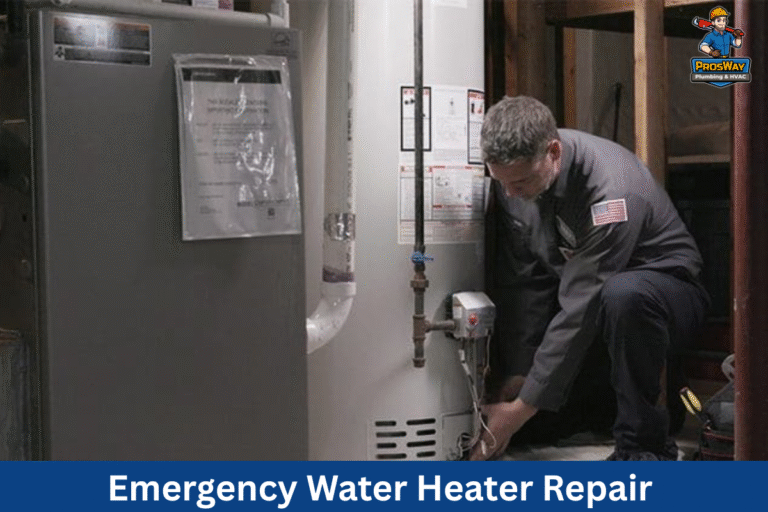A water heater may look like a simple steel tank, but inside it depends on one small component to survive years of constant exposure to hot water: the anode rod. This rod sacrifices itself to protect the tank walls from rust and corrosion. Without it, even the best water heater won’t last long. The anode rod water heater directly determines how long the tank will function without leaks or costly breakdowns. Ignoring this part leads to rust-colored water, foul odors, and even early tank failure. This guide outlines what an anode rod does, how to spot failure, repair or replacement options, and when to call a professional plumber for help.
What Is an Anode Rod and Why Does it Matter?
An anode rod, also called a sacrificial anode, is a long metal rod made of magnesium, aluminum, or zinc-aluminum alloy. It’s installed inside the water heater tank and is fully submerged in water. Its purpose is to attract corrosive elements like dissolved oxygen, salts, and minerals before they attack the steel tank.
This works through an electrochemical process. The anode becomes the “sacrificial metal,” giving up electrons to prevent rust on the tank’s steel lining. Instead of corroding the tank itself, the rod takes the damage.
- Magnesium rods: Best for soft water, offer strong protection but deplete faster (about 3–5 years).
- Aluminum rods: Better for hard water, last longer (7–10 years), but may leave white sediment.
- Zinc-aluminum rods: Reduce sulfur or rotten egg odors linked to bacterial activity in hot water.
Most homeowners never see their anode rod, but plumbers check it during service visits by removing it with a socket wrench and inspecting its condition. A healthy rod ensures the steel tank remains intact for its expected lifespan of 8–12 years.
Signs of Anode Rod Failure
Spotting the signs of a bad anode rod early can save your water heater. Key indicators include:
- Rust-colored hot water: Oxidized minerals or rust entering your faucets from a corroding tank.
- Sulfur or rotten egg odor: Caused by a magnesium rod reacting with sulfates in the water to form hydrogen sulfide gas.
- Noisy water heater: Popping or banging sounds happen when sediment builds up around a failing rod.
- Rising energy bills: Scale buildup forces the heating element or burner to work harder.
- Rod corrosion on inspection: If the rod is thin (less than ½ inch) or coated in calcium deposits, it’s no longer doing its job.
What Happens If You Ignore a Bad Anode Rod
A worn or missing water heater anode rod means the steel tank walls are exposed to direct corrosion. Once rust begins, it spreads quickly and compromises the tank.
Consequences include:
- Leaks around the tank – Once the steel rusts through, replacement is unavoidable.
- Shortened tank lifespan – Instead of lasting 10–12 years, the water heater may fail in 6–7 years.
- Costly water damage – Leaks can flood basements, garages, or utility rooms.
- Emergency replacement – Ignoring rod failure often forces a full emergency hot water heater replacement at the worst possible time.
Addressing the rod early is far cheaper than dealing with tank failure later.
How to Fix an Anode Rod?

An anode rod water heater relies on this sacrificial component to protect the steel tank from corrosion. When it fails, the tank is exposed to rust and sediment buildup. Fortunately, homeowners and plumbers have several proven repair options to extend the life of the unit.
1. Flush the Tank to Reduce Sediment
Sediment and calcium deposits often collect around a deteriorating rod, trapping heat and creating popping or banging noises inside the tank. Flushing helps restore efficiency and reduces stress on the heating system:
- Turn off the circuit breaker (electric) or gas valve (gas).
- Connect a garden hose to the drain valve near the bottom of the heater.
- Open the valve and drain several gallons into a bucket or drain.
- Close the valve, refill the tank, and restore power.
Regular flushing every 6–12 months keeps mineral buildup under control and slows corrosion.
2. Replace the Anode Rod
Installing a new rod is the most effective repair. A new magnesium or aluminum anode rod restores protection. Magnesium rods dissolve faster but offer stronger defense, while aluminum rods last longer in hard water areas.
Steps for replacement:
- Shut off the power or gas and close the cold-water supply valve.
- Drain a few gallons of water so the rod port is not submerged.
- Locate the anode rod on top of the tank (under a cap or hex head).
- Use a socket wrench and breaker bar to remove the old rod (sometimes very tight).
- Insert the new rod, apply Teflon tape to the threads, and torque it snugly without over-tightening.
3. Treat Odor Issues With Zinc Alloy Rods
Some homeowners experience a rotten egg smell caused by magnesium rods reacting with sulfates in the water. Replacing with a zinc-aluminum anode rod or upgrading to a powered titanium anode solves odor problems by reducing hydrogen sulfide gas production.
4. Inspect Tank Health During Replacement
While changing the rod, check for:
- Thick rust flakes or discoloration on the old rod (a sign of aggressive corrosion).
- Wet insulation under the access panel (suggests internal leaks).
- Rod diameter: replacement is recommended if less than ½ inch remains.
When to Replace an Anode Rod?
A healthy rod usually lasts 3–5 years, but its lifespan varies based on water quality and heater usage. Soft water depletes rods faster, while hard water forms deposits that coat the rod.
Replacement is necessary when:
- The rod has worn to less than ½ inch thick.
- It’s coated in calcium deposits and no longer attracts corrosion.
- You notice rust-colored water or a persistent sulfur odor.
- The water heater is 8–12 years old; in this case, a new rod may not stop existing tank corrosion.
Inspecting every 2–3 years ensures problems are caught before tank damage becomes irreversible.
Repair vs. Full Water Heater Replacement
Not every anode problem requires a new water heater.
- Repair makes sense when the tank lining is intact, and only the anode rod is depleted. A $30–$60 rod replacement can buy years of added service.
- Replacement is smarter when the tank is leaking, the inner lining is corroded, or the heater has passed its expected lifespan. Spending money on rods in these cases won’t prevent failure.
Many homeowners weigh the repair vs. replacement cost: if a repair costs 50% or more of a new water heater, replacement is the more cost-effective long-term solution.
When to Call a Plumbing Professional?

Certain warning signs mean it’s time to stop DIY and call a licensed plumber. Persistent sulfur odor, discolored hot water, or strange noises like popping and rumbling often point to a failing anode rod or tank corrosion.
Visible rust on fittings, leaks near the drain valve, or moisture around the insulation also suggest damage beyond the rod itself.
Professional plumbers both replace the anode rod correctly and inspect the storage tank, sacrificial anode type, and overall system health. They confirm the replacement rod, even if magnesium, aluminum, or zinc-aluminum blend, matches your water quality.
Pros also use proper tools like a socket wrench with a breaker bar to safely remove a seized rod without cracking the tank. Skipping professional help can void warranties and lead to improper sealing.
Preventing Future Anode Rod Problems
Prevention extends the lifespan of both the rod and the water heater:
- Annual inspections: Check rod condition, tank lining, and replace rods proactively.
- Regular flushing: Drain the heater at least once a year to remove sediment and calcium deposits that speed rod wear.
- Water softeners: In hard water areas, installing a water softener reduces mineral buildup that consumes rods faster.
- Scheduled maintenance: Having a plumber check the anode rod every 2–3 years prevents corrosion from spreading.
- Plan proactive replacement: Replace rods about every 3–5 years, or sooner if your water has high salts, oxygen, or is softened.
Conclusion
An anode rod water heater may seem like a small component, but it plays a critical role in protecting your tank from rust and corrosion. Ignoring rod failure leads to costly problems like leaks, tank damage, and premature replacement. Watching for warning signs, such as sulfur odor, rust-colored water, or noisy operation, gives you the chance to act early and extend the heater’s lifespan. Replacement of the whole unit may be the safer option if your water heater is already over 8–12 years old and showing signs of internal corrosion.
Protect Your Water Heater With ProsWay Plumbing & HVAC!
Don’t wait until rust or leaks force a costly emergency. ProsWay Plumbing & HVAC offers expert inspections, changing the anode rod in water heaters, and full water heater service across Northern New Jersey. Call us now at (862) 260-5870 or Book Online today to schedule your water heater inspection or anode rod replacement and protect your home’s hot water system for years to come.








